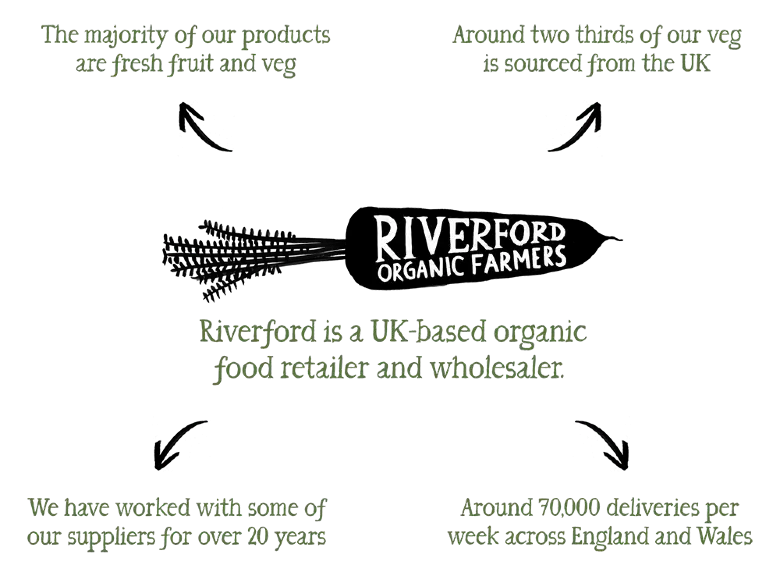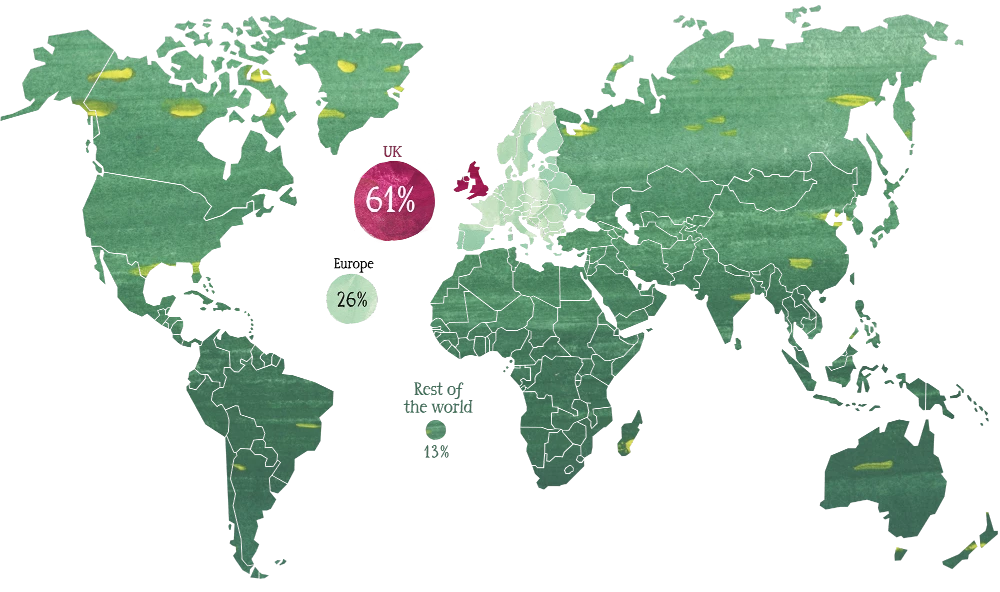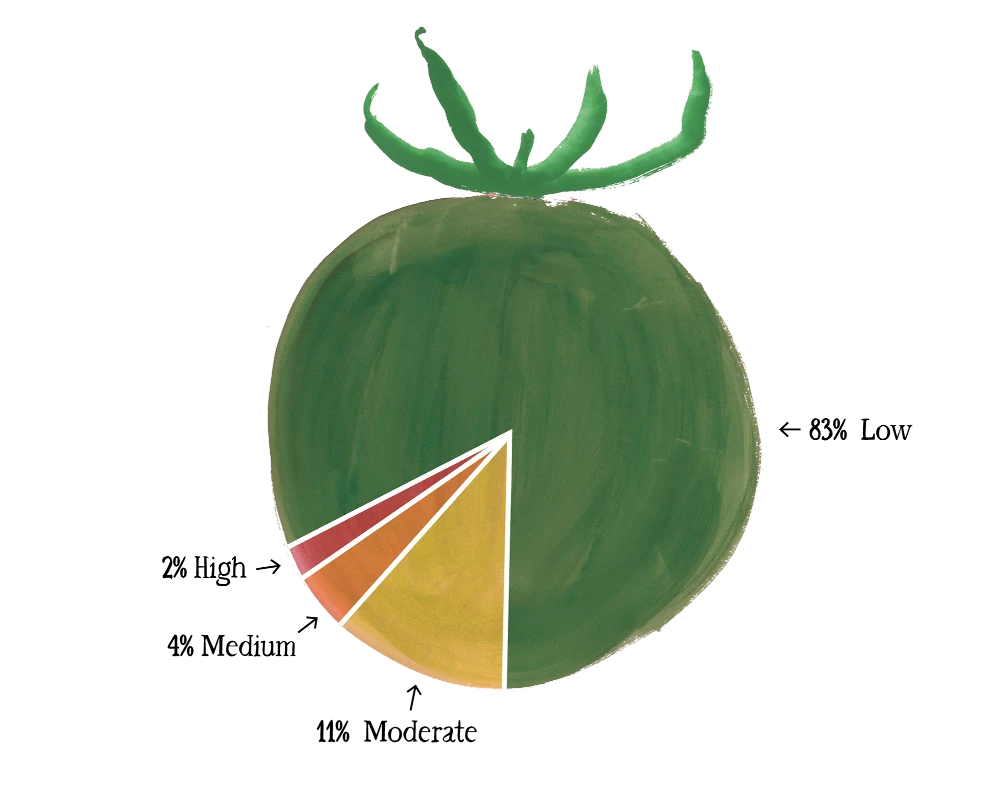
Overview
Riverford will not accept modern slavery in our supply chain. Although we can't be everywhere all the time, we are dedicated to fair employment and actively reducing modern slavery and human trafficking risks. This statement complies with Section 54 of the Modern Slavery Act 2015, summarising our actions for the fiscal year ending April 28th 2023.
Modern slavery affects 49.6 million people globally (GSI, 2023). Increased migration is making many people more vulnerable to human trafficking and exploitation, with modern slavery being found in all industry sectors. The Asia-Pacific region has as many as 29.3 million victims (GSI, 2023).
The UK witnessed a 116% rise in modern slavery cases in 2022, with 6,516 potential victims (Unseen, 2023). Recent policy changes in the UK, like the Illegal Migration Act 2023, increase the risk of modern slavery by denying support to, and enabling easier detention and deportation of, vulnerable people.
Our business structure and supply chain
Riverford Organic Farmers is an employee-owned company, growing, packing, and delivering organic produce direct to customers' doorsteps in England and Wales. Most of our products are fresh fruit and veg, straight from farms. UK-based sourcing represents the majority of our purchases. The rest is sourced from UK growers and makers, European growers, and growers in Africa, North America and South America. Our supply base is built on long-term relationships; in some cases, we've worked with our suppliers for over 20 years.
Our suppliers by region

Our policies
We have developed Riverford's policies for effective due diligence and the assessment of modern slavery risks based on:
Despite having a largely UK-based supply chain, we also source some products globally. With global sourcing activities come an increased risk of modern slavery in our supply chain. To mitigate this risk, we embed the principles of the above documents, and our own stance on ethical food production, into our sourcing principles and supplier approval process. We make sure that our Whistleblowing Policy and Fair Labour Policy are both available to all Riverford co-owners as part of the induction process, and that our suppliers uphold the Riverford Supplier Charter. The Whistleblowing Policy provides a safe channel of communication for co-owners to voice concerns about modern slavery or anything else relating to poor business or labor practices at Riverford that may be worrying them, and the Fair Labor Policy describes how co-owners at Riverford can expect to be treated. Created in collaboration with suppliers, the Riverford Supplier Charter sets out what suppliers can expect from their relationship with us, and what we expect of them, including alignment with the principles of the ETI Base Code. This allows us to demonstrate to suppliers how we expect a fair supply chain to work.Due diligence and risk assessment
Riverford is rare for a business of our size, in that we deal directly with the vast majority of our suppliers, avoiding middlemen that disconnect the retailer from the producer. Having direct, long-lasting relationships with a network of small suppliers gives us greater confidence in their production practices and treatment of staff. However, remaining vigilant against the risks of modern slavery is paramount.
The risk profile of our supply chain, when the prevalence of modern slavery around the world is considered, is shown by the following chart.
Risk of modern slavery in Riverford's supply chain
percentage of suppliers by risk profile
percentage of suppliers by risk profile

Riverford's highest risk items are tropical fruit. Geographically speaking, this risk is concentrated in central and south America (Peru and Colombia).
To assess the actual and potential risks of modern slavery and human trafficking in our supply chain, we utilise principles found in the ETI Base Code. We conduct a desk-based risk assessment (covering national, sectoral, regulatory, socioeconomic, and political factors affecting a supplier's country or region), and use a suite of modern slavery indicators to assess suppliers during visits.
In our own operations, we have identified the use of labour agencies as a potential risk: it means we don't have direct relationships with some employees. To prevent exploitation, we only work with Gangmasters and Labour Abuse Authority (GLAA) licensed recruitment agencies, regularly audit the agencies we work with to ensure they are licensed by the GLAA, and talk to employees to establish an on-the-ground picture of working conditions.
If risks or incidents of slavery are suspected in our supply chain or our operations, our Slavery Reporting Process will be used:

Checks and visits
Our due diligence processes allow us to scope for country- and sector-specific risks, while a direct working relationship (wherever possible) with suppliers gives us a greater visibility of our supply chain. However, modern slavery is not always obvious; people may go to great lengths to conceal this criminal activity.
Due to the nature of our supply base (a great number of smaller suppliers and family farms), it's difficult for us to visit 100% of suppliers in a year. We have a high frequency of visits to UK suppliers (at least annually), and similar with European suppliers (mostly annually). Those further afield are usually visited at least once every three years. New suppliers are visited as standard practice.
While it's easy to see a positive image of labour conditions in our supply chain, we are aware of the hidden nature of modern slavery issues. We will continue to embed modern slavery indicator checks and visits into our procurement and supplier relationships.
We have been developing an audit process that focuses on worker interviews, auditing the key aspects of labour exploitation and specific modern slavery policy questions. This is being trialled prior to rollout across our supply base, and in our own farms and manufacturing facilities.
Capacity building
We will continue to deliver and revisit relevant training on the risks of modern slavery, with specific focuses for manufacturing and agricultural management roles at Riverford. We will be increasing the specificity of training, through workshops for Procurement Team members on tackling modern slavery in UK and global businesses, and through purchasing practices.
As a business that strives to help people find fulfilment, dignity, and pride their work, Riverford will continue to champion fairness in our own operations and supply chain.
This statement has been approved by the Riverford Board of Directors.

Rob Haward, Managing Director
References and Resources
ETI, 2017. Base Code Guidance: Modern Slavery [online]. ETI:London. Available at: https://www.ethicaltrade.org/resources/base-code-guidance-modern-slavery. Accessed on: 31.08.2023.
ILO, 2022. ILO Declaration on Fundamental Principles and Rights at Work and its Follow Up [online]. Available at: https://www.ilo.org/wcmsp5/groups/public/---ed_norm/---declaration/documents/normativeinstrument/wcms_716594.pdf. Accessed on: 31.08.2023.
UN, 2021. Universal Declaration of Human Rights [online]. Available at: https://www.un.org/sites/un2.un.org/files/2021/03/udhr.pdf. Accessed on: 31.08.2023.
Global Slavery Index, 2023. Global Modern Slavery at a Glance [online]. Available at: https://www.walkfree.org/global-slavery-index/map/#mode=data. Accessed on 21.08.2023.
Unseen, 2023. Modern slavery helpline calls at record high [online]. Available from: https://www.unseenuk.org/modern-slavery-helpline-calls-at-record-high/#:~:text=More%20than%207%2C300%20calls%20for,Helpline%20Annual%20Assessment%20for%202022. Accessed on: 21.08.2023.




